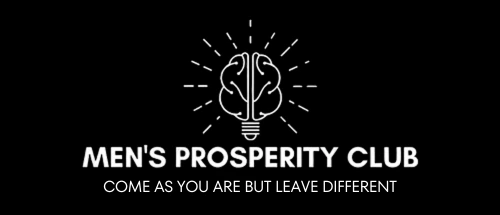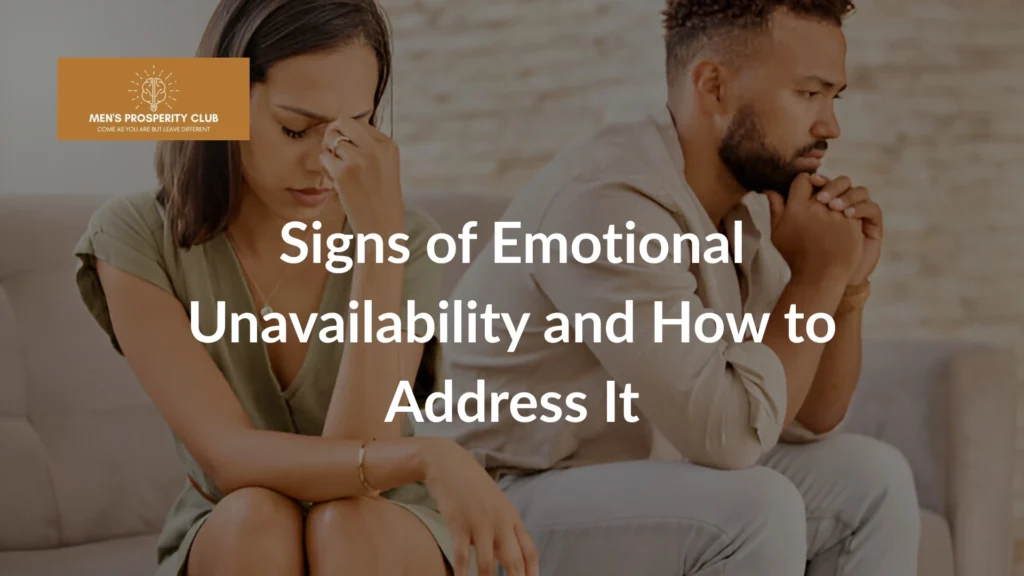Emotional unavailability can deeply affect relationships, whether it’s in romantic partnerships, friendships or even within families. It’s one of those issues that often flies under the radar, with many people unaware of how it’s impacting their ability to form deep, meaningful connections. If you’ve ever felt disconnected from a partner or found yourself in a relationship where intimacy seemed almost impossible, chances are, emotional unavailability played a role. But what exactly does emotional unavailability look like, and more importantly, how can it be addressed?
Let’s take a deep dive into understanding emotional unavailability, recognising the signs, and exploring ways to overcome it—ultimately creating healthier and more fulfilling relationships. And, in case you’re wondering, we’ll also touch on how organisations like Men’s Prosperity Club can support you on this journey of emotional growth and relationship development.
What is Emotional Unavailability?
Emotional unavailability refers to a person’s inability or unwillingness to engage with their emotions in a genuine and open way. This can show up in many different forms—whether it’s a partner who avoids deep conversations, a friend who is emotionally distant, or a family member who is always “too busy” to offer support when needed. Essentially, emotional unavailability means that the person has difficulty being present emotionally, which can create distance and a sense of isolation in relationships.
For some, emotional unavailability is a temporary phase, often triggered by specific circumstances like trauma or stress. For others, it’s a more persistent pattern that stems from deeper issues, such as fear of intimacy, childhood emotional neglect or unresolved past experiences. While emotional unavailability is not always intentional, the impact on relationships can be significant, often leading to feelings of frustration, loneliness and even resentment.
Signs of Emotional Unavailability
Understanding the signs of emotional unavailability is the first step toward addressing it. You might have noticed some of these behaviours in your relationships, but weren’t sure what they meant or how to label them. Let’s explore the key signs:
Reluctance to Open Up
If you’ve ever tried to have a heart-to-heart conversation with someone only to have them shut down or deflect, it could be a sign of emotional unavailability. People who are emotionally unavailable tend to keep personal details to themselves, even in long-term relationships. They avoid talking about their past, their feelings, or their true self.
Inconsistent Attention and Communication
When someone’s affection and attention are unpredictable, it can create a sense of emotional whiplash. One minute, they are warm and engaging; the next, they’re distant and unresponsive. This inconsistency is a hallmark of emotional unavailability. It leaves the other person feeling confused, undervalued, and unsure about where they stand.
Difficulty Expressing Feelings
Expressing emotions can be a challenge for many people, but those who are emotionally unavailable may seem completely detached when it comes to sharing their feelings. Instead of opening up about their emotions, they might change the subject, give vague responses, or avoid the conversation altogether.
Overemphasis on Independence
Being independent is generally a healthy trait, but for those who are emotionally unavailable, it can become a defence mechanism. They may push away any attempts at emotional closeness, preferring to handle everything on their own. This can lead to a lack of teamwork in the relationship and an inability to rely on one another during tough times.
Avoiding Vulnerability
Vulnerability is essential in building deep connections, but emotionally unavailable people often shy away from it. They might avoid sharing their fears, insecurities, or personal struggles, choosing instead to remain guarded and distant.
Fear of Commitment
People who struggle with emotional availability often have a deep fear of commitment. This might manifest in reluctance to define the relationship, make long-term plans, or engage in serious conversations about the future. They avoid being emotionally invested and may disengage whenever the relationship starts to feel too serious.
Difficulty Apologising
A lack of accountability for mistakes is another sign of emotional unavailability. Emotionally unavailable people often avoid apologising or taking responsibility for their actions, preferring to deflect blame or make excuses instead of owning up to their shortcomings.
Over-Criticism
If someone is overly critical of you or others, it might be a sign that they are emotionally unavailable. This behaviour creates emotional distance and makes it harder to build trust or connection. It often stems from their own discomfort with emotions and vulnerability.

How Emotional Unavailability Affects Relationships
The effects of emotional unavailability can be profound, leaving both parties feeling frustrated and disconnected. At first, it may seem like the relationship is just going through a rough patch, but over time, it becomes clear that something deeper is at play. Here are some of the key ways emotional unavailability impacts relationships:
Emotional Distance
Emotional unavailability creates a wall between people. Without emotional connection, relationships struggle to thrive. Partners may find themselves drifting apart, as one person becomes more withdrawn while the other yearns for a deeper connection.
Increased Resentment
When one person feels emotionally neglected, resentment can start to build. This might manifest as frustration, anger, or even passive-aggressive behaviour. Over time, these unresolved feelings can erode the relationship, making it difficult to move forward.
Miscommunication and Misunderstanding
Emotional unavailability often leads to a lack of communication or miscommunication. When one person is emotionally distant, they may fail to understand or address the needs of their partner. This can create tension and confusion, especially if one person feels like they’re doing all the emotional heavy lifting in the relationship.
Difficulty Resolving Conflict
Conflict is inevitable in any relationship, but emotional unavailability can make it incredibly difficult to resolve issues. When someone avoids confrontation or shuts down during disagreements, the problem remains unresolved. This can lead to a cycle of unresolved tension that continues to affect the relationship.
Overcoming Emotional Unavailability
Now that we’ve explored the signs and effects of emotional unavailability, let’s talk about what can be done to overcome it. The good news is that emotional availability is a skill that can be developed over time. Here are a few steps you can take to become more emotionally available in your relationships:
Self-Reflection
The first step in addressing emotional unavailability is self-reflection. Take a step back and examine your own behaviours and patterns. Ask yourself: Are you avoiding intimacy? Do you struggle to open up to others? Reflecting on these questions can help you understand the root causes of your emotional unavailability and start to address them.
Be Honest About Your Feelings
It’s very important to be honest with yourself about how you feel. Practice expressing your feelings, even if it feels uncomfortable at first. Start by opening up to someone you trust, and gradually work on being more vulnerable with others.
Communicate Openly
Communication is key to overcoming emotional unavailability. If you’re in a relationship with someone who is emotionally unavailable, have an open and compassionate conversation about the issue. Don’t shy away from discussing your feelings, and encourage the other person to do the same.
Seek Therapy
Sometimes, emotional unavailability stems from deep-seated issues, such as trauma or attachment wounds. In these kinds of situations, getting professional help through therapy can be very helpful. A therapist can guide you in understanding and healing from past experiences, helping you become more emotionally available in future relationships.
Set Healthy Boundaries
Being emotionally available doesn’t mean constantly giving to others without regard for your own needs. Set healthy boundaries to ensure that you’re taking care of yourself while also nurturing your relationships.

How Men’s Prosperity Club Helps You Overcome Emotional Unavailability
For men looking to improve their emotional availability and build healthier relationships, the Men’s Prosperity Club offers invaluable support. As a community dedicated to personal growth and emotional wellness, Men’s Prosperity Club provides a safe space where men can openly explore their emotions, address personal challenges, and learn to create deeper, more meaningful connections.
Through workshops, coaching sessions, and access to a supportive network, Men’s Prosperity Club helps men develop the emotional skills necessary for success in both personal and professional relationships. Whether you’re dealing with emotional unavailability, fear of commitment, or other relationship challenges, the club offers tools and resources to help you break free from these patterns and build a more fulfilling emotional life.
Final Thoughts: Embracing Emotional Availability for Stronger Relationships
Emotional unavailability can be a tough challenge to overcome, but with awareness and effort, it’s absolutely possible. By recognising the signs, understanding the impact on your relationships, and taking proactive steps to become more emotionally available, you can foster deeper connections and build healthier, more fulfilling relationships. And with support from groups like Men’s Prosperity Club, you don’t have to navigate this journey alone.




